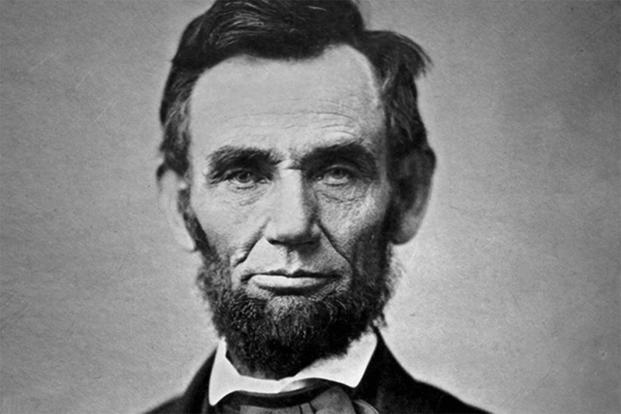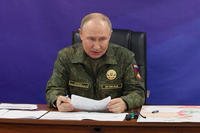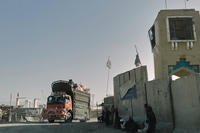The hardest days of any job are the day you start and the day you leave, even when you're fully qualified from the get-go.
Many of us embellish a little on our resumes, hoping to learn what (hopefully little) we don't know in the first few weeks on the job. Others get put to the test right away, thrown into a trial by fire they should be prepared to tackle.
There are very few who get tossed into the deep end, into a situation no one is prepared for, and perhaps no human has ever faced.
These are those people.
4. Puyi, the Last Emperor of China
Puyi was not the only emperor of China. He wasn't even the only emperor of the Qing Dynasty, which ruled the mainland since 1644. But he was the only emperor to ascend to the throne in the 20th century.
His real first day came in November 1908, but seeing as the young Puyi was only two years old, he had no real power. He would be kicked off the throne four years later when China became a republic, except ... no one told him. For a long time.
After a time as a kind of leader emeritus, Puyi was actually restored to the throne as an adult ... by the Japanese. The year was 1934. China was at war with Japan, which was actually the start of World War II in Asia. The Japanese controlled Manchuria (then called Manchukuo), and Puyi's first day as emperor (only of Manchukuo, by the way) was actually the day he betrayed all of China. Needless to say, the war didn't go well for the Japanese or their puppet governments. Puyi was captured by the Soviets in 1945 and then given to the Chinese Communists, who put him to work as a street sweeper.
Related: Search for Veteran Jobs
On his first day as a street sweeper, he got lost on his way home and asked for directions, saying: "I'm Puyi, the last emperor of the Qing dynasty. I'm staying with relatives and can't find my way home."

3. Staff Sgt. Esther McGowin Blake, the First Enlisted Woman in the Air Force
While the Air Force became an independent service in September 1947, women weren't fully integrated into the armed forces until President Harry Truman signed the Women's Armed Services Integration Act in 1948. The first woman in line to enlist was Esther McGowin Blake.
She was already a dedicated airman, having spent much of World War II as a civilian employee of the Army Air Forces Air Service Command at the Miami Air Depot. After her oldest son was shot down over Belgium in 1944, she enlisted in the Women's Army Corps to free up a man from a desk job.
After the war, she continued her service in the Army, but she really longed to be back in the Air Force. The moment she could join, she did and stayed on active duty until she was almost 60 years old.
Go ahead and look up some of the comments about women getting combat jobs in the military and imagine what it must have been like for the first women to be in the military ever.

2. Abraham Lincoln
As if the job of president of the United States wasn't already hard enough, the day Abraham Lincoln took office on March 4, 1861, seven of the 33 states in the Union had already seceded. South Carolina, Mississippi, Florida, Alabama, Georgia, Louisiana and Texas all left the Union, believing Lincoln would infringe on their rights as slave states even before he was inaugurated; the Confederate government was established in February 1861.
Lincoln's predecessor, President James Buchanan, had done nothing about the seceding states or the issue of slavery. He blamed the secession on Northern abolitionists and, while denying the rights of slave states to secede, he also said there was nothing the federal government could do.
Lincoln offered an olive branch in his inaugural address, but it wasn't enough. A month later, South Carolina attacked Fort Sumter, and four more states left the Union. The Civil War would dominate Lincoln's presidency.
1. Ben Sliney, National Operations Manager for the FAA
You may have never heard of Sliney. You may not know what the national operations manager for the Federal Aviation Administration actually does. Heck, you may not know about the Federal Aviation Administration. Sliney started his FAA career as an air traffic supervisor but left it to practice law. After he retired from his firm in 2000, he went back into the air-traffic control field. Soon, he was the head of the FAA's command center in Herndon, Virginia, overseeing all air traffic in America.
His first day at the job was Sept. 11, 2001.
After the second plane hit the Twin Towers in New York City, it was Sliney who made the decision to ground all air traffic in the United States. His decision grounded more than 4,200 planes, something that had never happened before or since.
"We were just trying to do something to try and resolve what was occurring and at least separate the good guys from the bad guys," Sliney told CBS News.
Find the Right Veteran Job
Whether you want to polish your resume, find veteran job fairs in your area or connect with employers looking to hire veterans, Military.com can help. Sign up for a free Military.com membership to have job postings, guides and advice, and more delivered directly to your inbox.
















